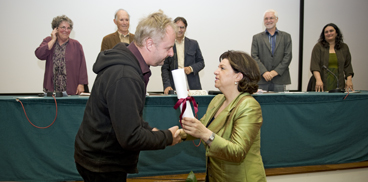SIEFF 2010

L'assessore Maria Lucia Baire consegna l'attestato a Reinhardt Björn.
SIEFF 2010 – The Winners
The first prize goes to
The Third Violin by Bjoern Reinhardt
For the visually rich portrait of a remote Romanian mountain village, the result of a on long term personal relationship based upon mutual respect and affection and technically achieved by a single person; the absence of unnecessary music and commentary allows an intensity of experience that is all too rare today.
The shared prize for the most innovative film goes to
Chaiqian / Demolition by J.P. Sniadecki
A statement about observation, the photographic frame, and the qualities of digital photography that allow us to enter the world of Chinese migrant workers and the rapidly changing urban landscape of Chengdu; the deep phenomelogically informed style results in a detailed and sensuous ethnography.
The shared prize for the most innovative film goes to
O Morro de Mangueira Como E’ by Carmen Opipari and Silvie Timbert
For the methodolical innovation that consists in abstracting from naturalistic “mise-en scene” by freeing the children protagonists from a negative connotated context, in order to tease out the meaning of their drawings, their body language and cheerful reflectiveness.
Special Commendation to
Alexander Gutman
for his film
17 Augusta
For its outstanding cinematographic qualities, opening a view into the confined
Existence of a Russian convict sentenced to life imprisonment.
Shared prize to the best Sardinian film to
Francesco Bussalai for his film:
Cancelli di fumo
For the liberty of crossing filmic genres as a way to approach historical collective memory: this was achieved through a work of collaboration and shared authorship between the filmmaker, one main actor and some prominent members of the community of the former workers of the factory.
Shared prize to the best Sardinian film to
Marco Antonio Pani for his film
Arturo torna dal Brasile
Rich iconic portrait of a multitalented doctor and filmmaker, that crossed oceans and cultures without losing contact with his Sardinian roots.
The shared prize for the best film, set and produced in a Mediterranean country goes to
Vivre Ici by Mohamed Zran
Evocative and with intensely poetic images, the film conveys effectively the fascination of a schizophrenic world and the complexity of reality.
The shared prize for the best film, set and produced in a Mediterranean country goes to
Arab Essarafa – Au Bas de l'Echelle by Tarek Ben Ghzaïel
This film draws viewers into the life of seasonal country workers in a Mediterranean setting, avoiding stereotypes and bringing to light the personalities and aspirations of each member of the family.
The first prize goes to
The Third Violin by Bjoern Reinhardt
For the visually rich portrait of a remote Romanian mountain village, the result of a on long term personal relationship based upon mutual respect and affection and technically achieved by a single person; the absence of unnecessary music and commentary allows an intensity of experience that is all too rare today.
The shared prize for the most innovative film goes to
Chaiqian / Demolition by J.P. Sniadecki
A statement about observation, the photographic frame, and the qualities of digital photography that allow us to enter the world of Chinese migrant workers and the rapidly changing urban landscape of Chengdu; the deep phenomelogically informed style results in a detailed and sensuous ethnography.
The shared prize for the most innovative film goes to
O Morro de Mangueira Como E’ by Carmen Opipari and Silvie Timbert
For the methodolical innovation that consists in abstracting from naturalistic “mise-en scene” by freeing the children protagonists from a negative connotated context, in order to tease out the meaning of their drawings, their body language and cheerful reflectiveness.
Special Commendation to
Alexander Gutman
for his film
17 Augusta
For its outstanding cinematographic qualities, opening a view into the confined
Existence of a Russian convict sentenced to life imprisonment.
Shared prize to the best Sardinian film to
Francesco Bussalai for his film:
Cancelli di fumo
For the liberty of crossing filmic genres as a way to approach historical collective memory: this was achieved through a work of collaboration and shared authorship between the filmmaker, one main actor and some prominent members of the community of the former workers of the factory.
Shared prize to the best Sardinian film to
Marco Antonio Pani for his film
Arturo torna dal Brasile
Rich iconic portrait of a multitalented doctor and filmmaker, that crossed oceans and cultures without losing contact with his Sardinian roots.
The shared prize for the best film, set and produced in a Mediterranean country goes to
Vivre Ici by Mohamed Zran
Evocative and with intensely poetic images, the film conveys effectively the fascination of a schizophrenic world and the complexity of reality.
The shared prize for the best film, set and produced in a Mediterranean country goes to
Arab Essarafa – Au Bas de l'Echelle by Tarek Ben Ghzaïel
This film draws viewers into the life of seasonal country workers in a Mediterranean setting, avoiding stereotypes and bringing to light the personalities and aspirations of each member of the family.


